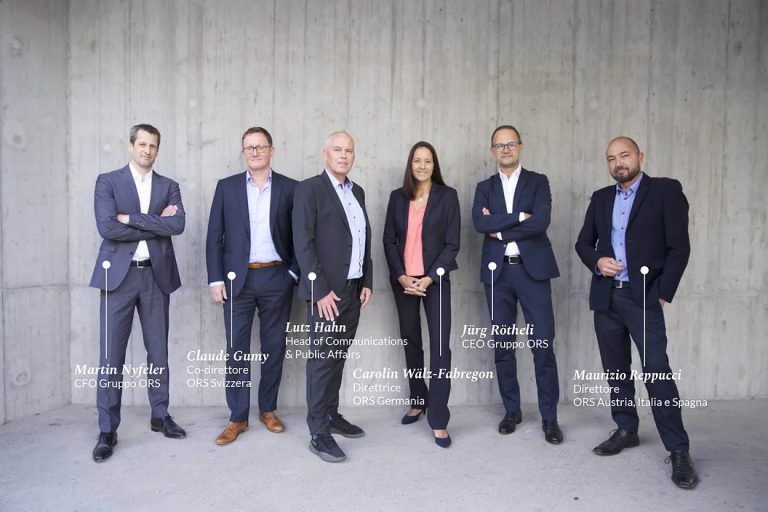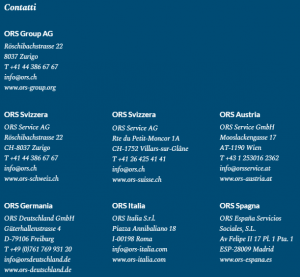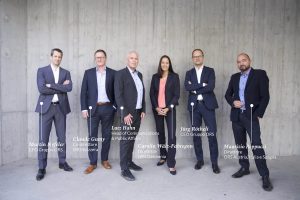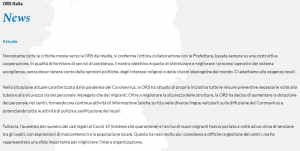
ORS Italia Srl is the new operator of the detention center (CPR) in Turin
Published on 18/02/2022 in No Cpr Torino
After a technical extension of two months after the expiry of the contract stipulated with GEPSA, the contract for the management of the “Permanent Centre for Repatriation” (administrative detention center) in Corso Brunelleschi was awarded, subject to a reservation, on 10 February 2022 to ORS ITALIA SRL.
The two evaluation criteria of the Prefectural Commission were the technical offer and the economic offer, which were worth respectively 70 and 30 points out of a total of 100. ORS obtained the highest score for the technical offer, which allowed the multinational to aim for an 11% reduction in the economic offer.
The cost of the service per capita is thus 37.97 euros, while the cost of the so-called “entry kit” is 133.5 euros.
WHO ORS IS
Acronym for “Organisation for Refugee Services”, ORS has been one of the leading private companies in the “field of migrant assistance” mainly in German-speaking countries for more than 30 years. It operates more than 100 facilities in Switzerland, Austria (where it was responsible for the management of all reception centres until the end of 2020), Germany and Italy and employs more than 1400 people.

ORS Service AG is wholly owned by Ors Holding, which in turn is wholly owned by OXZ Holding (OX Group), also based in Zurich. The OX Group was founded in 1992 by the former manager of the temporary agency Adecco and in 2013 was acquired by a private equity fund controlled by the London-based , a spin-off of the bank Barclays, active since 2011. According to the online finance magazine , the board of directors of OXZ is composed of three managers, two of whom are Equistone’s men. In essence, the British company has full control over the choices of the Swiss company. To put it in more understandable terms, this is a long history characterised by a series of speculative operations typical in the game of finance where companies are bought precisely with the aim of revaluing them and then liquidating them after a few years. Founded in 1992 by entrepreneur , former general manager of the recruiting company Adia (the future Adecco), OX Group was bought in 2005 by private equity Argos Soditic, a French company also present in Italy. The investment closed on 26 June 2009 when ORS passed to of Zurich, another financial company in the sector. The deal involves ORS Service, its current parent company OX Holding and another company in the refugee sector: Asyo AG, of which ORS was a subsidiary at the time. Here, too, the figures are a mystery. However, sources close to the transaction, as reported by the , assure that Argos would have made three times the capital gain on its investment. After Invision, it was Equistone’s turn to benefit from the group’s market expansion. In 2017, however, the ORS group had a turnover of $99 million, which was three times the figure for 2014.
It is clear that politics and finance are closely intertwined. Decisions are taken by the ORS Group management, whose board consists of the Group CEO, the managing directors of the national companies and the directors of the head offices. However, the Advisory Board, which “advises ORS as a specialist committee on current and future migration issues and recommends solutions for the implementation of the strategy and the further development of the divisions”, is made up of personalities from politics such as the former Swiss Minister of Justice, Police and Migration (FDJP) Ruth Metzler Arnold (Chair), former Swiss MPs Rita Fuhrer and Erwin Jutzet,, former Austrian Vice-Chancellor, former Minister of Finance and Foreign Affairs Michael Spindelegger as well as prominent figures from the world of temporary employment such as Thomas Bäumer. The CVs of some of them are enriched by posts on various boards in the private finance sector. In 2017 Ruth Metzler-Arnold joined the board of the private bank REYL & Cie after having been involved in UBS, PricewaterhouseCoopers, AXA, Novartis and Swiss Medical Network SA, a giant of private clinics. From 2010 to 2018 Rita Fuhrer was a member of the board of directors of Raiffeisen bank. Others replenish them by taking on roles in non-governmental organisations: Spindelegger, for example, has been head of the Center for Migration Policy Development (ICMPD) since 2016.
ORS Italia is just the latest piece in this dark mosaic.

ORS Italia Srl
But let us now turn to the Italian company. As mentioned above, Ors Italia srl is a wholly owned subsidiary of the Swiss parent company that was founded in 2018. Among the most relevant figures of the company we find Jürg Rötheli, CEO of the Swiss parent company, who chairs the Board of Directors. Antonio Reppucci is the board member, a position he previously held at a private clinic in Atripalda, near Avellino. Managing director is Maurizio Reppucci, whose background includes a diploma in psychiatric nursing, the direction of two drug treatment centres and five years as managing director of an ORS subsidiary where he dealt precisely with refugees.
2018 is not a random year, many factors contributed to ORS starting to look at Italy as a new frontier of profit at the expense of human lives.
The first concerns the fact that the company’s business on home soil has not been so rosy since the 2015 EU-Turkey agreements. Indeed, the agreements were intended to block the so-called Balkan route by closing the borders of Austria and some Balkan countries. Despite the obvious failure of this policy, which included the construction of physical walls at the borders, Switzerland nevertheless experienced a sharp drop in asylum applications to the extent that ORS had to close 19 reception centres. Also in 2019, Switzerland implemented a series of regulations that effectively accelerated the bureaucratic process of assessing applications by reducing the number of migrants to be redistributed to the various centres.
ORS has also had problems in Austria, where in 2015 it ended up at the centre of controversy due to the management of the Traiskirchen refugee centre, which was also the subject of an Amnesty International Report denouncing its inhumane conditions. This lager, designed for 1800 people, was containing more than 4600. But the sting came when the then Interior Minister Herbert Kickl, in the wake of the scandal, decided to entrust the hitherto private management of the reception centres to a specially created public agency (BBU). The decision of the current leader of the sovereignist FPO party, driven by no magnanimous spirit but by the sole desire to have control over the detention of migrants, caused ORS to close 7 centres.
But, no fear. It’s 2018, Salvini is in the height of his megalomania at the Viminale and in October of the same year he signs with the Cinque Stelle Paty the first Security Decree. The government’s crackdown on the Italian reception system also manifests itself in the drastic downsizing of the SPRARs in favour of the CASs, managed by the private sector. In short, it is a great opportunity for companies such as ORS, which specialise in this field.
“The awarding of contracts to private service providers makes it possible to relieve state structures considerably. Italy is an important first step in our expansion in the Mediterranean.
This was the official announcement that arrived on 22 August 2018, about a month after the registration of the srl with the Chamber of Commerce’s Register of Companies. Needless to say, after just one year, the newborn CPR of Macomer was awarded, for just over half a million euros. In reality, the first winner of the tender was a joint venture made up of “L’Angolo”, Società Coop of Modena and Coop Sociale Alea of Tortolì, but it succeeded in winning the Sardinian lager following the request for annulment presented by ORS itself and also thanks to the advantageous offer resubmitted with a further 3% reduction.
The race to the bottom for the “new” company is not a problem, primarily because it can count on a large amount of capital behind it. In March 2020, the Prefecture of Cagliari entrusted it with the management of the CAS and the CPA in Monastir by emergency procedure, and in May of the same year it was awarded an increase of 67,000 euro for increased services in the CPR in Macomer. In September, ORS was also awarded the management of Casa Malala in Trieste, through an auction that started from 800,000 euros and that ORS was able to win thanks to a 14% discount.
The contract between the Prefecture of Nuoro and ORS Italia s.r.l. expires on 19 January 2022, but does not leave Sardinia empty-handed. ORS, in fact, was awarded the contract for the management of the CPR of Ponte Galeria-Rome, on 21 December 2021, for a total amount of €7,201,988.38, following the exclusion of the first company in the ranking list, Officine Sociali, which had submitted an excessively low bid.
In short, the company’s intentions are clear from the outset: to enter the market at full tilt and rout the competition. And it can’t be said that it hasn’t succeeded: in just under a year, the public tenders in which it has participated have yielded 2.5 million euros in profits, against an initial paid-up share capital of just 10,000 euros.
Since they were set up, CPRs have undergone many changes: they have changed their name, they have changed their managers, they have changed how they operate, especially in recent years. The attempt is to oil this mechanism, this extremely profitable business. What is most noticeable, however, is the synchronisation and collaboration between the State and private companies, or cooperatives, which are increasingly specialised in the management of the centres. On the one hand, a State that needs to spend as little as possible on the “migrant issue”, and on the other hand, the possibility and desire of private companies to make a profit.
What certainly has not changed and will not change under any other management is the imprisonment to which undocumented people are forced, the systemic racism and violence they suffer on a daily basis, and the miserable living conditions to which they are forced. Fortunately, neither will the desire for freedom and the will to break free from these cages, to destroy them and turn them into dust.
Not all of them suffer passively, and the protests of those who are imprisoned are continuous and countless. Every day there are individual protests and collective revolts, resistance to expulsions, escapes, damage and fires, which over the years have also led to partial and even total closures of these camps.
This is the road that the rioters and rebels have shown us over the years, this is the road that leads to freedom.

